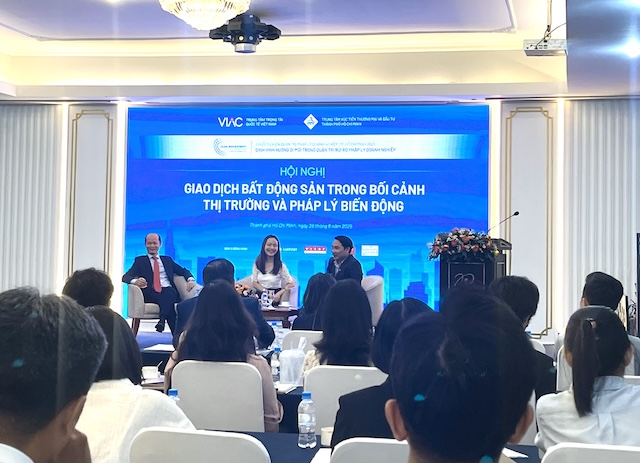
A vibrant conference on real estate transactions amidst a dynamic market and legal landscape, held in Ho Chi Minh City on August 28, 2025, and organized by VIAC and VCCI – Photo: TM
|
Attorney Vu Thi Que, Founding Partner and Chairwoman of Rajah & Tann LCT Lawyers, emphasized that bank guarantees are a crucial legal mechanism to protect the rights and legitimate interests of buyers of off-plan properties while enhancing the accountability of developers in project implementation.
According to the 2023 Law on Real Estate Business, the obligation to provide bank guarantees falls not on the buyers but is a mandatory responsibility of the developers. Prior to signing sales contracts, developers must obtain a written commitment from domestic commercial banks or branches of foreign banks legally operating in Vietnam to issue guarantees. This prerequisite ensures the safety of customers’ capital. When requested by the buyer, the developer must provide a guarantee letter for each contract.
However, in practice, many developers fail to fulfill this obligation. Some developers only obtain a project-wide commitment for guarantees without issuing specific letters for individual contracts. In other cases, if the buyer does not request a guarantee, the developer may choose not to provide one; some developers even offer a price reduction equivalent to the fee they would have paid to the bank for the guarantee. This situation raises an important legal question: Is such an agreement legal?
As per Attorney Vu Thi Que, while current legislation gives buyers the right to choose whether to accept a guarantee letter, developers cannot use this as an excuse to evade their initial obligation to seek bank guarantees. Developers are mandated to obtain a written commitment from banks to issue project guarantees, and this must be done before signing sales contracts. However, many developers face challenges in obtaining these commitments as they may have already mortgaged the project itself to secure loans for development. When it comes to the stage of issuing guarantee commitments, they may lack sufficient collateral or funds for escrow.
A common solution is for developers to negotiate escrow on a pro-rata basis, considering the number of actual sales contracts. Typically, a project may have around 500 units, and developers can estimate the number of customers who have made earnest deposits. Based on this, they negotiate the escrow ratio instead of escrowing the entire amount. However, some banks are stringent and require the issuance of guarantees for the entire project, refusing to accept guarantees on a per-unit basis. This varies depending on individual bank policies.
Notably, the 2023 Law on Real Estate Business does not consider bank guarantees as a mandatory condition for trading off-plan properties but rather as a mechanism to protect customer interests. Therefore, the lack of a guarantee does not invalidate the sales contract. In reality, during legal proceedings, courts have upheld the validity of sales contracts even in the absence of bank guarantees. This is a crucial point for litigating lawyers to consider.
However, LS Que cautioned that legal risks remain for developers. In the event of market fluctuations or a significant drop in property prices, customers can file a complaint alleging that the developer breached their obligation to provide a guarantee, thus requesting the transaction’s cancellation or compensation for damages. To mitigate risks, developers should obtain clear written confirmation from buyers if they choose to waive the guarantee.
The guarantee mechanism in the 2023 Law on Real Estate Business serves both protective and legally binding purposes. While it is not a condition for contract validity, it is an important basis for dispute resolution. Therefore, both developers and customers need to comprehend the nature of the transaction and, if necessary, seek legal counsel to avoid unintended legal consequences.
The City of Ho Chi Minh: Redevelopment of Old Apartments in 42 Wards
“Ho Chi Minh City is proactively rolling out incentives and support for the renovation and reconstruction of apartment buildings constructed before 1994. The city is taking a proactive approach to address the aging infrastructure and improve the living conditions for its residents.”
Unleashing a New Strategic Move: From Suburban Conquest to the Core of Metropolitan Dominance
“After a period of robust restructuring and a focused approach on projects in satellite cities surrounding Ho Chi Minh City, Phat Dat Real Estate Development Corporation (HOSE: PDR) is entering a new phase of growth with an intensified vision: to direct its strategic efforts towards the heart of metropolitan areas and develop iconic projects. This bold yet calculated move by the company underscores its determination to solidify its standing in the gradually flourishing market.”
Proposed Railway Project: The Western Link – Connecting the Old Binh Duong Province
The Bau Bang – Moc Bai railway line will connect the industrial parks of the old Binh Duong and Tay Ninh provinces, opening up a world of opportunities for businesses and locals alike. This strategic infrastructure project will facilitate seamless connectivity, enhance logistics efficiency, and boost economic growth in the region. With the railway line in place, businesses can look forward to streamlined transportation of goods, while locals can expect improved access to employment opportunities and a boost in the overall standard of living. The Bau Bang – Moc Bai railway line is poised to become a game-changer, transforming the landscape of industrial development and connectivity in the area.
What Do Record-High Remittances to Vietnam Signify?
In 2024, Vietnam witnessed a remarkable influx of remittances, totaling approximately $16 billion. Ho Chi Minh City, a bustling metropolitan hub, led the way with an impressive $9.6 billion, reflecting a significant increase of $140 million from the previous year. This substantial sum is a testament to the city’s thriving economy and robust financial standing, outshining foreign direct investment by a factor of three. The record-breaking figure underscores the resilience and potential of Vietnam’s financial landscape, marking a historic high that promises continued prosperity.




















